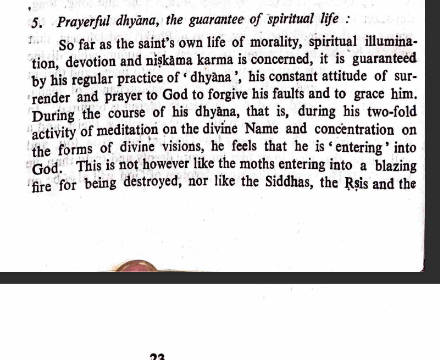So far as the saint’s own life of morality, spiritual illumination, devotion and niskama karma is concerned, it is guaranteed by his regular practice of ‘dhyana’, his constant attitude of surrender and prayer to God to forgive his faults and to grace him. During the course of his dhyana, that is, during his two-fold activity of meditation on the divine Name and concentration on the forms of divine visions, he feels that he is ‘entering’ into God. This is not however like the moths entering into a blazing fire for being destroyed, nor like the Siddhas, the Rsis and the deities who entered into the Viśvarūpa for the sake of being protected (11.21, 29), but like a river into the ocean for being one with it. His surrender is not like that of a slave before a tyrant, but of a loyal and grateful subject before a benevolent King, or, better still, like that of a child into the arms of his mother. Naturally, his prayers also are not like the loud cries of a beggar for alms; nor are they meant only for relieving him and his kith and kin from miseries of poverty and disease, but mainly for receiving the Lord’s grace so that he may grow in spiritual knowledge, joy and peace. His genuine love for God entitles him to implore God to send His grace, as if, as a matter of right. It is his dhyana-yoga which makes him more and more of a veteran soldier of the spiritual life, who fights mercilessly against the wanton pranks and stupidities of the flesh, and captures the citadels of the senses, the mind and the buddhi in which his enemies in the form of desires, temptations, lust and anger go for shelter, and kills them outright (3.40, 41). “Being lodged in Brahman, he becomes as unperturbed and as uncontaminated as Brahman,” (5.30), though on all hands he is surrounded by upadhis’ of various kinds. ‘Like a flame which burns without a flicker’, he stands erect and unmoved in spite of the violent winds of passion which might blow over him, or of the terrible calamities which might be fall him (6.19-21). Sometimes, like a tortoise, he withdraws his senses from the objects of sensuous pleasures and desires; while sometimes, like an ocean he allows all the violent currents of desires, passions and anger to enter into him, so that they all might lose their urge and be dissolved into the calm and peace of the Brahman which he enjoys’. (2.58, 70). And, sometimes, again, just as waves dashing furiously against a rock recede without making any dint on it, even so desires themselves leave the saint who has seen the Atman (2.59). Verily does he go beyond the excesses of pleasures and pains and beyond the bondage of the three guņas on account of his unswerving devotion to God (14.26).

